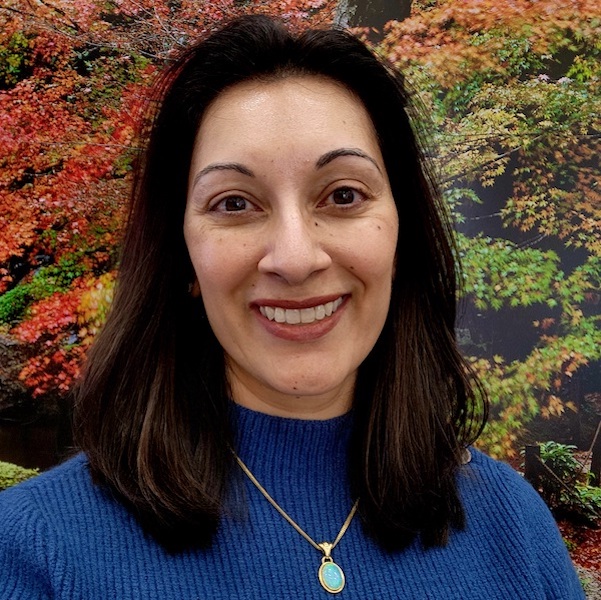Nandita S. Mani, Dean of University Libraries

The degree was instrumental in my career, as it propelled me to go into health sciences librarianship.
Hailing from Edmonton, Alberta, Canada, Nandita S. Mani, Ph.D., has been Dean of University Libraries at UMass Amherst since August of 2022, where she oversees the largest public research library in New England and is committed to advancing the university’s focus on justice, equity, diversity and inclusion (JEDI) through initiatives like reparative cataloging and through the activation of special collections directly aligned with social change and social justice. Prior to UMass, Mani was Associate University Librarian for Health Sciences at the University of North Carolina-Chapel Hill for six years. In addition to publishing numerous articles on health literacy, global health, information science and instructional design and technology, Mani also served a 10-year term as managing editor for Advances in Chronic Kidney Disease and is also the editor of two volumes from IGI-Global Publishing, Handbook of Research on Academic Libraries as Partners in Data Science Ecosystems (with Michelle A. Cawley) and Perspectives on Justice, Equity, Diversity, and Inclusion in Libraries (with Michelle A. Cawley and Emily P. Jones).
Q. What was your path to this profession? Did you always want to work in libraries?
A. My mom had worked in libraries for her entire career, specializing in government documents. Although I never knew what it was to fully work in libraries, the thing that stood out to me was when she would come home and talk about how she helped students find relevant information for their thesis. Being able to answer those questions – and it was never the same question twice! – gave her tremendous satisfaction. She was never bored, and as her daughter, I also enjoy the challenge of connecting people to the information they need.
Q. Why did you choose Wayne State's School of Information Sciences?
A. It was the array of expertise the faculty held and the different areas where I could learn about libraries and the integration with technology. In addition, being in Detroit was an opportunity for me to learn more about engagement with the community and the outreach done through the program. Of course, the strength in health sciences and the collaboration with the medical library were a huge draw, too, as I’ve always had a strong interest in the field.
Q. What were some of your best experiences in the program?
A. The practicum experience at Shiffman Medical Library was instrumental as part of my program. This enabled me to work directly with health science librarians and staff and to learn more about medical databases, the concepts around evidence-based medicine, the differences in teaching medical and health science students about evaluation of information and the importance and relevance of consumer health when partnering with community organizations. This also was key in providing me with on-the-ground experience that enhanced my accelerated time in the master’s program.
Q. How did your degree prepare you for your career and your current role?
A. The degree was instrumental in my career, as it propelled me to go into health sciences librarianship, where I worked in research-intensive universities and a large health care system. If not for my LIS experience at Wayne State, I would not have had the opportunity to delve into instructional roles, community outreach and research – all of which have played key roles in the development of my career, and all of which have yielded lessons that I apply to my role as Dean of University Libraries at an R1 land grant university.
Q. What is something you have found surprising about the field of library and information science?
A. The integral nature of evaluating information. Even though it has always been important, it is only becoming more complex due to technological advancement – not just the abundance of information on the internet, but also the development of artificial intelligence (AI). The role of the librarian has become even more crucial in order to help people sift through, process and identify trustworthy sources of information. Libraries as a whole are incredibly important to providing access to information, and a significant aspect of that is making it discoverable, usable and comprehensible to the end user.
Q. What is your favorite part of your job?
A. It’s the moments when I get to work with people or teams towards a common good, including coaching people to help them identify their potential and help them discover opportunities for their growth. There’s nothing more satisfying for me than seeing someone reach their potential or identify that they have talent they’d never recognized before. Seeing that happen on a larger scale, when a team coalesces and fires on all cylinders, is transformative and exciting!
Q. What advice would you give to current/prospective students?
A. Keep your options open! Be open to new topics, new areas that you may not have known would be interesting. Seek internships in areas where you think you may want to delve deeper to see if it really is something you’re passionate about. Network! Talk to the people who have the jobs you think you want and find out what their day-to-day is like. Listen to what they love about their jobs, and what they find challenging about the work. Build those professional connections so that you will be able to do the same for the folks who follow you into the profession.